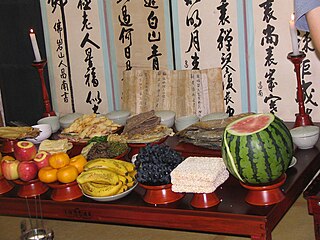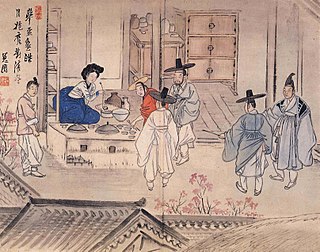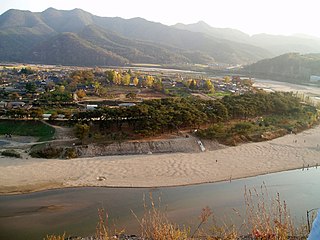
Tug of war is a sport that pits two teams against each other in a test of strength: teams pull on opposite ends of a rope, with the goal being to bring the rope a certain distance in one direction against the force of the opposing team's pull.
Kim is the most common surname in the Korean Peninsula, accounting for nearly 22% of the population. Kim is written as "김" gim in Korean. The hanja for Kim can also be transliterated as Hangul: 금 geum "metal, iron, gold". The Kim family is also the ruling family in North Korea.

Suwon is the capital and largest metropolis of Gyeonggi-do, South Korea's most populous province which surrounds Seoul, the national capital. Suwon lies about 30 kilometres south of Seoul. It is traditionally known as "The City of Filial Piety". With a population close to 1.2 million, it is larger than Ulsan, although it is not governed as a metropolitan city.
The Yangban, were part of the traditional ruling class or gentry of dynastic Korea during the Joseon Dynasty. The yangban were mainly composed of civil servants and military officers—landed or unlanded aristocrats who individually exemplified the Korean Confucian idea of a "scholarly official". Basically, they were administrators and bureaucrats who oversaw ancient Korea's traditional agrarian bureaucracy until the Joseon Dynasty ended in 1894. In a broader sense, an office holder's family and descendants as well as country families who claimed such descent were socially accepted as yangban.

Chuseok, literally "Autumn eve", once known as hangawi, is a major harvest festival and a three-day holiday in South Korea celebrated on the 15th day of the 8th month of the lunar calendar on the full moon. Chuseok is the biggest and most important traditional holiday of South Korea from the past because Korea was an agrarian society and considered the harvest season as a major event around the year. Like many other harvest festivals around the world, it is held around the autumn equinox, i.e. at the very end of summer or in early autumn.

Korean cuisine has a wide variety of traditional alcoholic drinks, known as sul (술). Many of these drinks end with the Sino-Korean word -ju, and some end with the native Korean word -sul. The Sino-Korean -ju is not used as an independent noun.

Sikhye is a traditional sweet Korean rice beverage, usually served as a dessert. In addition to its liquid ingredients, sikhye contains grains of cooked rice and in some cases pine nuts.

Kim Chwa-chin or Kim Chwa-jin, sometimes called the "Korean Makhno" or by his pen name Baekya, played an important role in the attempt of development of anarchism in Korea.

The Hahoe Folk Village is a traditional village from the Joseon Dynasty. The 'Ha' is short for river and 'hoe' means to 'turn around, return, come back." The village is a valuable part of Korean culture because it preserves Joseon period-style architecture, folk traditions, valuable books, and an old tradition of clan-based villages.

Andong / Antung (Wade-Giles), or Liaodong was a former province in Northeast China, located in what is now part of Liaoning and Jilin provinces. It was bordered on the southeast by the Yalu River, which separated it from Korea.
Kwon (권) is a Korean family name. Some sources list as many 56 clans, but most of them were merged with the Andong Kwon clan under the Sijeung-gong faction soon after the establishment of the Republic of Korea.

Heotjesatbap, a traditional Korean dish, is a variety of bibimbap, served with soy sauce (ganjang) instead of the gochujang that is more commonly used. Heotjesabap consists of mainly several types of namul over white rice. It is also served with grilled fish and some jeon.

Andong-jjimdak (안동찜닭) is a variety of jjim, which originated in the city of Andong, Gyeongsangbuk-do Province and is made with chicken, various vegetables marinated in a ganjang based sauce. The name literally means "steamed chicken of Andong."
The Battle of Andong was a fight between North Korean and South Korean units in late July 1950. It was an early maneuver of the Korean War.
Yeongsan soemeoridaegi is a traditional game in Korea which is selected as the 25th Important Intangible Cultural Property next to Andong's Chajeon Nori. It is originally played in Yeongsan-myeon, Changnyeong-gun, Gyeongsangnam-do, Korea. It is also called Mokwujun, wood cow fighting or cow wood fighting in the province.

Andong soju is a type of distilled soju produced in Andong, North Gyeongsang Province, South Korea. It is a traditional, a distillation soju that has been handed down in the Andong region of North Gyeongsang Province.
Traditional games of Korea have been influenced by the culture, history and environment of the Korean Peninsula. Koreans have enjoyed games throughout history with family and friends, and the games create a sense of community. The most popular traditional games are Ganggang Sulrae, Jegichagi, Neolttwigi, Ssireum, Tuho, Hitting tombstone and Yutnori.

Juldarigi is a traditional Korean sport similar to tug of war. It has a ritual and divinatory significance to many agricultural communities in the country, and is performed at festivals and community gatherings. The sport uses two huge rice-straw ropes, connected by a central peg, which are pulled by teams representing the East and West sides of the village. A number of religious and traditional rituals are performed before and after the actual competition.
The Gim clan of Andong refers to two Korean clans. They were prominent yangban families during Korea's Joseon dynasty originating from Andong, North Gyeongsang province, during the Goryeo dynasty. The clan produced many individuals who passed the gwageo, as well as three queens. Both clans derive from the Gim clan of Gyeongju.













